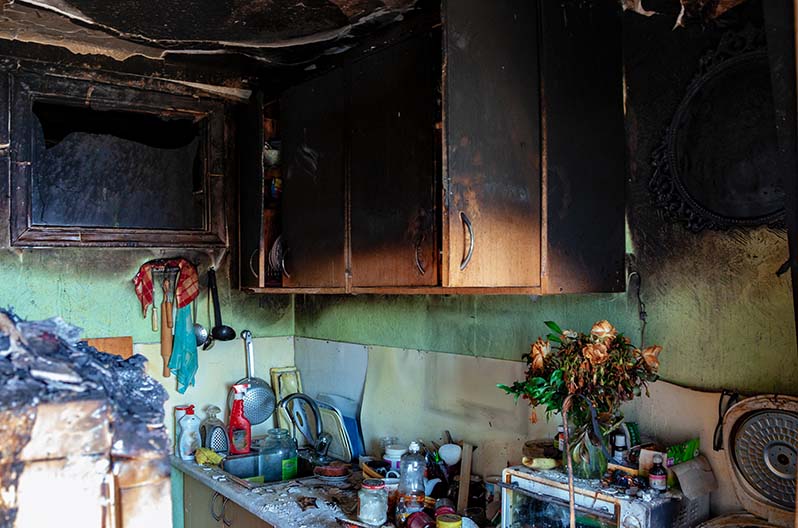Even small fires can produce thick black smoke, leaving soot stains throughout your house. Flames can damage your furniture, while smoke and soot may contaminate food and cosmetics. We look at things that can be salvaged after a fire. Plus, we cover what to throw away after a house fire.
What Can Be Salvaged After a House Fire?
The easiest things to save after a fire are hard, non-porous surfaces. However, never keep anything burned, charred, or melted. Here are the three things you can salvage after a fire:
- Glass – Glass is resilient and easy to clean after a fire. Scrub soot stains with vinegar and baking soda, then soak in vinegar to remove smoke odors.
- Metal – While fires can leave stains, metal withstands most damage. Clean them with vinegar and dish soap, then lightly sand and paint the metal to keep it from rusting.
- Hardwood Floors – Unless there is extremely charring or burn marks, you can almost always salvage hardwood floors after a fire. Clean the floors with oil soap, then sand and refinish as needed.
What To Throw Away After a House Fire
Since fires can damage almost anything in your home, throw away anything burned, melted, or damaged by heat or flames. Here are the most common things to throw way after a fire:
Melted or Stained Plastics
Even small fires will ruin plastic items because they can actually pull in smoke and soot. Since cleaning these stains is difficult, you should always throw away plastics after a fire.
Canned or Boxed Foods Exposed to the Fire
You should throw away canned or boxed foods after a fire, especially open packages. Smoke and soot can contaminate the food and make you sick.
Food Left at Room Temperature
After a power outage, your should throw away spoiled food in your refrigerator or freezer. Food will spoil in your refrigerator in two to six hours, while freezers take 12 to 24 hours. Regardless of whether the power went out, throw out everything if the fire entered your fridge.
Medicine, Cosmetics, and Hygiene Products Exposed to the Fire
Make sure you throw away medicines, cosmetics, and hygiene products damaged by the fire. While expensive, it’s best to assume smoke and soot contaminated these items after a fire. Call your doctor immediately if you throw away prescription medication.
Small Electronics
Always check small electronics like kitchen appliances, TVs, and game systems for water and heat damage before using them. Either repair or throw away anything melted, burned, or stained.
Burned Clothing, Towels, or Bedding
It’s best to throw away charred or burned clothing, towels, or bedding. For minor soot stains, wash items with dish soap. To remove smells, soak fabrics in vinegar before washing.
Furniture and Mattresses Damaged by Fires
Always throw away furniture and mattresses burned in a fire, as they can fall apart. However, you can usually salvage hardwood furniture with minor to moderate smoke and soot stains by cleaning them with oil soap. You may need to sand and refinish the wood with severe stains.
Where Can I Get Help After a House Fire?
Knowing what to save and what to throw away is just one of the things you need to do after a fire. You also need to secure your home and repair the fire damage. Plus, you need to replace damaged items.
Repairing your home and replacing damaged items can be expensive, so call your insurance company as soon as possible. In some cases, you may also qualify for house fire victim assistance. Contact DisasterAssistance.gov, FEMA, or your local government for more information.
How To Get Help After a House Fire
Regardless of whether you are using your insurance or house fire victim assistance, here are the best places to get help after a house fire.
- Insurance Company – Unless the fire is minor, you should always call your insurance company. They will assess the damage and pay for most fire damage repairs.
- Restoration Contractor – While you can clean up minor smoke and soot damage on your own, always get professional help for larger fires. Fire damage restoration companies have the training and equipment to repair your home quickly and safely.
- American Red Cross – The American Red Cross has offered local disaster relief services for more than 140 years. They can help you find food, clothing, medicine, and a place to stay.
- Community Organizations – Many local community organizations also offer disaster relief and can offer meals, clothing, and temporary housing.
- Nonprofit Crisis-Counseling Centers – If you have significant fire damage, nonprofit crisis-counseling centers offer personal and financial counseling to help you cope with the incident.
Although you can clean up minor damage on your own, you should call a restoration contractor if:
- The fire damaged more than a six-foot area of one room
- There is fire damage in more than one room
- Flames burned through the walls, floor, ceiling, or roof
- Heavy smoke and soot spread throughout your home
- Firefighters responded and used hoses to put out the fire
No matter the size of the fire, Restoration Local repairs smoke, soot, and fire damage throughout your home. Call 877-941-2788 now for 24-hour emergency service and a free quote on fire restoration services.





